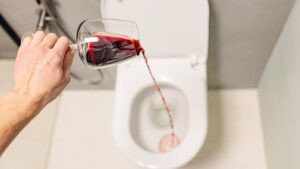How to survive holiday party season – without the sore head

Pic via Getty Images
What can you do to take care of yourself if you know you’ll be drinking or find you’ve inadvertently had a few too many? Here are six ways to stay healthy this party season.
Words by Sarah Marinos at bodyandsoul.com.au
The holiday season is a time for celebration, but it can also be a time for overindulgence.
With countless parties, work functions and family gatherings, it’s easy to get caught up in the festivities and forget about your health.
And the next morning your brain and body will be a befuddled and throbbing reminder of the night before.
There’s no escaping the fact that one of the best ways you can look after your health during the holiday season is to carefully monitor how much alcohol you drink – if you drink at all.
The last working day before Christmas marks the start of an upswing in alcohol-related issues, according to VicHealth.
The authority notes that over the festive season, harms from alcohol skyrocket, with more ambulance call-outs, police-recorded assaults and hospital admissions due to alcohol intoxication.
Whether you’re at a barbecue with family, at an end-of-year lunch with workmates or on a night out with friends, as the holiday mood takes over, it can be all too easy to throw caution aside and enjoy a few drinks too many.
While drinking sensibly and following the Australian Alcohol Guidelines are the safest options, here’s how to take care of your body if you are planning to have a few drinks.
#1. Boost your nutrients
Alcohol – specifically too much alcohol – affects our brain and body in all kinds of ways.
For starters, it causes dehydration and depletes our stores of essential nutrients such as zinc and vitamin B3, also known as niacin.
Vitamin B3 helps with brain function and energy production, and zinc is important for our immune system and skin health.
A study published in the Journal of Clinical Medicine in 2019 noted healthy levels of zinc and vitamin B3 in the body may help break down alcohol and result in less severe hangovers.
Foods rich in vitamin B3 include chicken, meat, fish, legumes and nuts; while zinc can be found in meat, fish, seafood, chicken, cereals, wholegrains, nuts, seeds and dairy foods.
“You can’t speed up the rate at which your body breaks down alcohol – on average, it takes the liver about an hour to metabolise one unit or standard drink,” naturopath Mim Beim says.
“But you can ensure your body has (the) nutrients it needs to help with alcohol detoxification.”
#2. Be kind to your gut
Your gut health also plays a role in how your body copes with alcohol.
While most alcohol is broken down by the liver, some alcohol remains in the gut where it can upset the balance of gut bacteria. This can lead to an upset stomach and diarrhoea.
“Our gut contains bacteria that feed on alcohol, like yeast or candida,” nutritionist Filipa Bellette explains.
“We always have those bacteria in low amounts, but they feed on alcohol and that can lead to an overgrowth of candida.
“This won’t happen overnight but if you drink regularly throughout December and into January, that’s long enough to cause some issues.”
Probiotic foods and drinks can help restore gut balance, including yoghurt, sauerkraut, miso, kefir, tempeh, kimchi and kombucha.
#3. Eat before and while you enjoy a drink
It’s not an old wives’ tale that you should eat before you drink alcohol – having food in your stomach does indeed help slow the absorption of alcohol.
“By eating before drinking, the rate at which alcohol reaches the small intestine is slowed, helping to taper absorption to a pace that your body can more easily manage,” John Hopkins University notes.
Its Student Well-being Blog suggests eating foods with a mix of protein, fat and carbohydrates.
Think egg and cheese sandwiches; bean burritos with cheese and vegetables; paneer or chicken tikka; salmon with rice; a tofu bowl with rice and stir-fried veggies; or a burger with sweet potato fries.
The blog also notes: “Consuming food when drinking alcohol increases the rate of alcohol elimination from the bloodstream by 25 to 45 per cent.”
#4. Up your electrolytes
Alcohol’s dehydrating effect causes a loss of electrolytes – essential minerals such as sodium, calcium and potassium that help our body function.
When your electrolytes are depleted, you might experience fatigue, headaches, nausea and muscle cramps or weakness.
“After you’ve been drinking, it’s important to replace electrolytes and you can do this by eating foods high in these minerals, like bananas and avocado,” Bellette says.
“You can also drink fluids with electrolytes, such as coconut water or some electrolyte powder dissolved in water, which is high in magnesium, potassium and sodium.”
#5. Recover with bland foods
It’s the morning after and it’s time for a reset. What’s the best approach when it comes to food and drink?
“Avoid rich, spicy foods that aggravate the gut and choose bland foods like crackers, oatmeal or a piece of sourdough toast,” Bellette suggests.
“Or have a breakfast packed with antioxidants such as eggs with spinach or asparagus.”
And it’s a good idea to put your daily caffeine hit on hold.
“Coffee puts extra strain on the liver, and your liver will already be working hard to process the alcohol,” Bellette explains.
“So enjoy a refreshing herbal tea instead, like dandelion or ginger tea.”
Know your standard drinks
Australian Alcohol Guidelines recommend no more than 10 standard drinks a week and no more than four standard drinks on any one day to reduce the risk of harm.
But what is a standard drink? Here’s what you need to know:
- A pint (570ml) of full-strength beer equals 2.2 standard drinks
- An average restaurant serve of red wine (150ml) equals 1.6 standard drinks
- An average restaurant serve of white wine (150ml) equals 1.4 standard drinks
- A pre-mix spirits can (375ml; 5% alc/vol) equals 1.5 standard drinks
- A shot of spirits (30ml) equals one standard drink
This article first appeared in bodyandsoul.com.au
Related Topics

UNLOCK INSIGHTS
Discover the untold stories of emerging ASX stocks.
Daily news and expert analysis, it's free to subscribe.
By proceeding, you confirm you understand that we handle personal information in accordance with our Privacy Policy.








